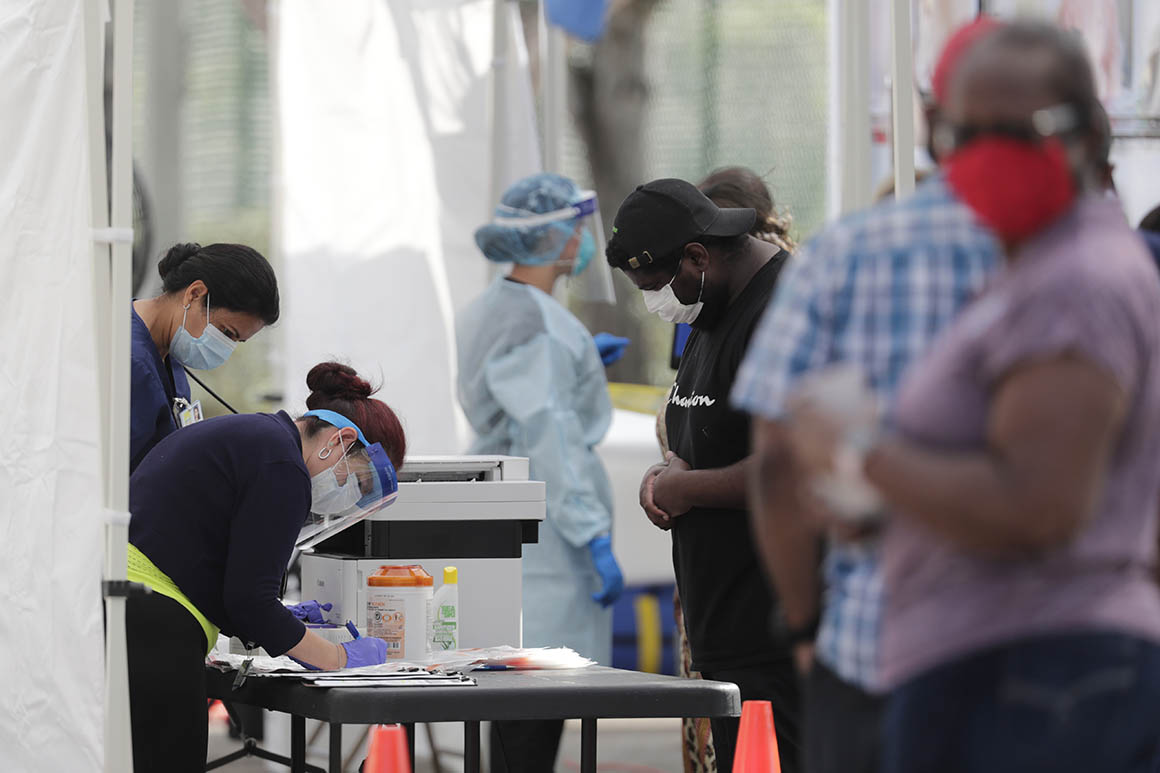
Critics blame the Trump administration for deferring too much decision-making to states and localities and leaving businesses hanging in its eagerness to reboot the economy.
„We’ve got different people in different places doing different things because there is no universal plan, no comprehensive plan to guide people, and I think that to me is very unacceptable,” said Rep. Alma Adams (D-N.C.), who chairs the House Education and Labor Subcommittee on Workforce Protections.
The government’s top infectious diseases expert, Anthony Fauci, last week warned about the possibility of new hot spots if businesses don’t heed the existing recommendations and instead rush to reopen.
“We are going to see upticks in cases even in the best circumstances,” Fauci said on CNN. “Don’t start leapfrogging over some of the recommendations and the guidelines because that’s really tempting fate and asking for trouble.”
The testing picture is complicated by the fact that several federal agencies provide guidance on business planning during the pandemic, though their enforcement powers are limited.
No enforceable rules
The Equal Employment Opportunity Commission, which polices workplace discrimination, said in April that employers can require workers to be tested, wear masks and have their temperatures checked as a condition of employment without running afoul of federal discrimination and disability law.
The Occupational Safety and Health Administration oversees worker safety, often relying on the Centers for Disease Control and Prevention for technical expertise. But OSHA hasn’t issued a mandatory workplace safety standard for Covid-19, so whatever guidelines it and the CDC develop are largely unenforceable.
The agencies and others have moved to set guardrails for businesses coming back from lockdowns. New CDC guidelines for office buildings suggest employers step up disinfection of work spaces, promote distancing and screen for Covid-19 symptoms. FEMA separately announced the government will distribute non-contact infrared thermometers to support workplaces “with a high degree of person-to-person interaction.”
The landscape makes it possible for employers to make Covid-19 screening or testing a condition of employment, meaning they could delay a worker’s start date or withdraw a job offer if someone is shown to have symptoms, said Beth Alcalde, an attorney at the law firm Akerman LLP. However, the EEOC has cautioned an employer must screen all potential employees applying for the same job.
Beyond the evolving rules is the question of whether there are enough tests to even open critical segments of the economy. Experts including Ashish Jha, director of the Harvard Global Health Institute, have warned more than 900,000 daily tests are needed to safely reopen the country — more than double the amount being conducted today. A lack of basic supplies like swabs that bedeviled earlier efforts to contain the virus could again prove to be a roadblock.
“It was inadequate testing that precipitated the national shutdown,” Jha told the House Select Subcommittee on the Coronavirus Crisis last month. “We must not make the same mistakes again as we open up our nation.”
Even blanket testing won’t guarantee that a business is free of Covid-19. Diagnostic tests can prove unreliable and can miss an infection. And antibody tests, once promoted as a vital tool for safely reopening the economy, are meant to identify who has been exposed to the virus, not active cases. The CDC says antibody tests should not be used to make decisions about employees returning to work.
“There is no way to be 100 percent certain that we’re not going to have a virus in the workplace no matter what you do,” said Jay Wohlgemuth, Quest’s chief medical officer.
Lawmakers aware of the limitations are working to insulate companies from legal claims. Senate Majority Leader Mitch McConnell says the GOP is working to provide Covid-19 liability protections to companies that are sued for failing to protect their workers and customers from the illness.
Business groups including the U.S. Chamber of Commerce are asking for “targeted liability relief” for businesses that work to follow the government’s guidelines.
Employers worry „about potential [legal] exposure if they do something that falls short of securing the safety and health of their population,” Alcalde said.
The CDC largely has avoided making recommendations when employees should be tested for an active coronavirus infection. But the agency says employers shouldn’t require sick employees to submit to a test or to produce a doctor’s note to qualify for sick leave or return to work.
Though the agency has taken steps like recommending facility-wide testing in nursing care facilities, it doesn’t have any corresponding guidance for businesses on testing employees. CDC spokesperson Jason McDonald told POLITICO it is up to state or local health departments to provide specific guidance to businesses on testing.
“Testing is a complex issue, and right now CDC doesn’t have the establishment-wide guidance to give an employer who’s interested in doing testing,” John Howard, director of the National Institute for Occupational Safety and Health, said during a worker safety hearing last week. “We may be coming out with more guidance on that issue, but right now we don’t have enough information.”
Source: politico.com
See more here: news365.stream






